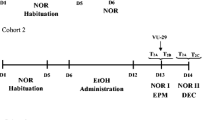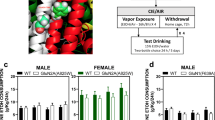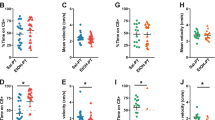Abstract
Antagonists of theN-methyl-D-aspartate subtype of glutamate receptor have been reported to block the development of tolerance to various effects of ethanol and opiates, using paradigms in which tolerance is believed to be governed by learning. There is considerable evidence to implicate theN-methyl-D-aspartate receptor in learning processes, and therefore the ability of the antagonists to block tolerance has been attributed to their effects on learning. To evaluate this hypothesis, we compared, in C57BL/6 mice, the effect of the uncompetitiveN-methyl-D-aspartate receptor antagonist, dizocilpine, on environment-dependent (associative) tolerance to ethanol, which is governed by learning, and on environment-independent (nonassociative) ethanol tolerance, in which learning plays a minimal role. Environment-dependent tolerance was induced by repeated ethanol injections, and dizocilpine blocked the development of this type of tolerance to the hypothermic and incoordinating effects of ethanol. In contrast, when environment-independent ethanol tolerance was induced by feeding the mice an ethanol-containing liquid diet, dizocilpine treatment had no effect on the development of tolerance to the hypothermic, incoordinating or hypnotic effects of ethanol. The results support the hypothesis that the effect of N-methyl-D-aspartate receptor antagonists on ethanol tolerance reflects the more general role of this receptor in processes involving learning and memory.
Similar content being viewed by others
References
Bitrán M, Kalant H (1991) Learning factor in rapid tolerance to ethanol-induced motor impairment. Pharmacol Biochem Behav 39:917–922
Cederbaum AI, Dicker E, Lieber CS, Rubin E (1977) Factors contributing to the adaptive increase in ethanol metabolism due to chronic consumption of ethanol. Alcohol Clin Exp Res 1:27–31
Chen CS (1968) A study of the alcohol-tolerance effect and an introduction of a new behavioral technique. Psychopharmacologia 12:433–440
Collingridge GL, Lester RAJ (1989) Excitatory amino acid receptors in the vertebrate central nervous system. Pharmacol Rev 40:143–210
Crowell CR, Hinson RE, Siegel S (1981) The role of conditional drug responses in tolerance to the hypothermic effects of ethanol. Psychopharmacology 73:51–54
Grant KA, Snell LD, Rogawski MA, Thurkauf A, Tabakoff B (1992) Comparison of the effects of the uncompetitive N-methyl-D-aspartate antagonist (±)-5-aminocarbonyl-10,11-dihydro-5H-dibenzo[a,d]cyclohepten-5,10-imine (ADCI) with its structural analogs dizocilpine (MK-801) and carbamazepine on ethanol withdrawal seizures. J Pharmacol Exp Ther 260:1017–1022
Hoffman PL, Tabakoff B (1984) Neurohypophyseal peptides maintain tolerance to the incoordinating effects of ethanol. Pharmacol Biochem Behav 21:539–543
Javitt DC, Zukin SR (1989) Interaction of [3H]MK-801 with multiple states of the N-methyl-D-aspartate receptor complex of rat brain. Proc Natl Acad Sci USA 86:740–744
Jones BJ, Roberts DJ (1968) The quantitative measurement of motor incoordination in naive mice using an accelerating Rotarod. J Pharm Pharmacol 20:302–304
Kalant H, Le Blanc AE, Gibbins RJ (1971) Tolerance to, and dependence on, some non-opiate psychotropic drugs. Pharmacol Rev 23:135–191
Keiding S, Christensen NJ, Damgaard SE, Dejgard A, Iversen HL, Jacobsen A, Johansen S, Lundquist F, Rubenstein E, Winkler K (1983) Ethanol metabolism in heavy drinkers after massive and moderate intake. Biochem Pharmacol 32:3097–3102
Khanna JM, Wu PH, Weiner J, Kalant H (1991) NMDA antagonist inhibits rapid tolerance to ethanol. Brain Res Bull 26:643–645
Khanna JM, Kalant H, Shah G, Chau A (1992a) Effect of (+)MK-801 and ketamine on rapid tolerance to ethanol. Brain Res Bull 28:311–314
Khanna JM, Kalant H, Weiner J, Chau A, Shah G (1992b) Ketamine retards chronic but not acute tolerance to ethanol. Pharmacol Biochem Behav 42:347–350
Lê AD, Poulos CX, Cappell H (1979) Conditioned tolerance to hypothermic effect of ethyl alcohol. Science 206:1109–1110
Le Blanc AE, Gibbins RJ, Kalant H (1973) Behavioral augmentation of tolerance to ethanol in the rat. Psychopharmacologia 30:117–122
Le Blanc AE, Kalant H, Gibbins RJ (1976) Acquisition and loss of behaviorally augmented tolerance to ethanol in the rat. Psychopharmacology 48:153–158
Lindros KO, Stowell L, Väänänen H, Sipponen P, Lamminsivu U, Pikkarainen P, Salaspuro M (1983) Uninterrupted prolonged ethanol oxidation as a main pathogenetic factor of alcoholic liver damage: evidence from a new liquid diet animal model. Liver 3:79–91
Macrae JR, Scoles MT, Siegel S (1987) The contribution of Pavlovian conditioning to drug tolerance and dependence. Br J Addict 82:371–380
Mansfield JG, Cunningham CL (1980) Conditioning and extinction of tolerance to the hypothermic effect of ethanol in rats. J Comp Physiol Psychol 94:962–969
Marek P, Ben-Eliyahu S, Gold M, Liebeskind JC (1991) Excitatory amino acid antagonists (kynurenic acid and MK-801) attenuate the development of morphine tolerance in the rat. Brain Res 547:77–81
Melchior CL, Tabakoff B (1981) Modification of environmentally cued tolerance to ethanol in mice. J Pharmacol Exp Ther 219:175–180
Melchior CL, Tabakoff B (1985) Features of environment-dependent tolerance to ethanol. Psychopharmacology 87:94–100
Mellanby E (1919) Alcohol: its absorption into and disappearance from the blood under different conditions. Med Res Counc Special Rep Ser (Lond) 15:1–48
Monahan JB, Handelmann GE, Hood WF, Cordi AA (1989) D-cycloserine, a positive modulator of the N-methyl-D-aspartate receptor, enhances performance of learning tasks in rats. Pharmacol Biochem Behav 34:649–653
Morris RGM, Anderson E, Lynch GS, Baudry M (1986) Selective impairment of learning and blockade of long-term potentiation by an N-methyl-D-aspartate receptor antagonist, AP5. Nature 319:774–776
Poulos CX, Cappell H (1991) Homeostatic theory of drug tolerance: a general model of physiological adaptation. Psychol Rev 98:390–408
Ritzmann RF, Tabakoff B (1976) Body temperature in mice: a quantitative measure of alcohol tolerance and physical dependence. J Pharmacol Exp Ther 199:158–170
Rogawski MA, Yamaguchi S, Jones SM, Rice KC, Thurkauf A, Monn JA (1991) Anticonvulsant activity of the low affinity uncompetitive NMDA antagonist (±)-5-aminocarbonyl-10,11-dihydro-5H-dibenzo[a,d]cyclohepten-5,10-imine (ADCI): comparison with the structural analogs dizocilpine (MK-801) and carbamazepine. J Pharmacol Exp Ther 259:30–37
Scheller MS, Zornow MH, Fleischer JE, Shearman GT, Greber TF (1989) The noncompetitive N-methyl-D-aspartate receptor antagonist, MK-801, profoundly reduces volatile anesthetic requirements in rabbits. Neuropharmacology 28:677–681
Siegel S (1976) Morphine analgesic tolerance: its situation specificity supports a Pavlovian conditioning model. Science 193:323–325
Siegel S (1979) The role of conditioning in drug tolerance and addiction. In: Keehn JD (ed) Psychopathology in animals: research and treatment implications. Academic Press, New York, pp 143–168
Siegel S (1983) Classical conditioning, drug tolerance and drug dependence. Res Adv Alc Drug Problems 7:203–246
Spangler EL, Bresnahan EL, Garofalo P, Muth NJ, Heller B, Ingram DK (1991) NMDA receptor channel antagonism by dizocilpine (MK-801) impairs performance of rats in aversively motivated complex maze tasks. Pharmacol Biochem Behav 40:949–958
Szabó G, Tabakoff B, Hoffman PL (1988) Receptors with V1 characteristics mediate the maintenance of ethanol tolerance by vasopressin. J Pharmacol Exp Ther 247:536–541
Tabakoff B, Hoffman PL (1992) Alcohol: neurobiology. In: Lowinson JH, Ruiz P, Millman RB (eds) Substance abuse: a comprehensive textbook. Williams and Wilkins, Baltimore, pp 152–185
Tabakoff B, Ritzmann RF (1977) The effects of 6-hydroxydopamine on tolerance to and dependence on ethanol. J Pharmacol Exp Ther 203:319–331
Tabakoff B, Melchior CL, Hoffman PL (1982) Commentary on ethanol tolerance. Alcohol Clin Exp Res 6:252–259
Tabakoff B, Cornell N, Hoffman PL (1986) Alcohol tolerance. Ann Emerg Med 15:1005–1012
Trujillo KA, Akil H (1991) Inhibition of morphine tolerance and dependence by the NMDA receptor antagonist MK-801. Science 251:85–87
Willner J, Gallagher M, Graham PW, Crooks GB Jr (1992) N-Methyl-D-aspartate antagonist D-APV selectively disrupts tastepotentiated odor aversion learning. Behav Neurosci 106:315–323
Wozniak DF, Olney JW, Kettinger L, Price M, Miller JP (1990) Behavioral effects of MK-801 in the rat. Psychopharmacology 101:47–56
Wu PH, Mihic SJ, Liu J-F, Lê AD, Kalant H (1993) Blockade of chronic tolerance to ethanol by the NMDA antagonist, (+)MK-801. Eur J Pharmacol 231:157–164
Author information
Authors and Affiliations
Rights and permissions
About this article
Cite this article
Szabó, G., Tabakoff, B. & Hoffman, P.L. The NMDA receptor antagonist dizocilpine differentially affects environment-dependent and environment-independent ethanol tolerance. Psychopharmacology 113, 511–517 (1994). https://doi.org/10.1007/BF02245231
Received:
Revised:
Issue Date:
DOI: https://doi.org/10.1007/BF02245231




